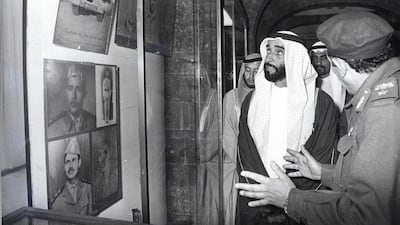ADEN // The smiling, triumphant fighters waving the flags of the UAE, Saudi Arabia, Bahrain and Yemen at the Marib Dam were not just celebrating a strategically important victory in the battle to restore stability to Yemen.
They were also fulfilling a vow by Sheikh Mohammed bin Zayed, Crown Prince of Abu Dhabi and Deputy Supreme Commander of the Armed Forces.
While visiting families of the Emirati troops killed in the line of duty in Yemen last month, Sheikh Mohammed had promised that the dam would be liberated from Houthi forces.
“As for the Zayed Dam, the Marib Dam, today the flag will be raised over it, God willing,” he said.
Why did Sheikh Mohammed attach so much importance to the dam?
More than 2,000 years ago, Marib was the capital of prosperous trading kingdoms. The land was renown for powerful female rulers, most famously the Queen of Sheba, also known as Balquis, who once questioned King Solomon in Jerusalem.
In the ancient times, Marib was an important waypoint along an international overland trade route that stretched between the Chinese and Roman Empires.
Residents were known for selling frankincense and myrrh, some of the most valuable products at the time.
A dam built in about 115BC irrigated thousands of acres of agricultural land and made Marib rich agriculturally. Civilisation grew and subsequent kingdoms thrived on the wealth offered by the waters.
It all ended about AD575, when the dam collapsed. Exactly why is debated, but the people living there had apparently forgotten the skills necessary to repair it.
The fields went dry. As the area turned to desert, thousands migrated.
Some went east, others north, travelling to settle in what is today the UAE, according to Peter Hellyer, an expert on UAE and Gulf archaeology and a regular columnist for The National.
In the 1980s, after flooding in the Marib governorate, Sheikh Zayed, the UAE’s Founding Father, offered to fund a new dam.
In 1984, he travelled to Yemen to lay the cornerstone of the project, and two years later, Sheikh Zayed returned for the new dam’s opening, which was also attended by Ali Abdullah Saleh, then president of Yemen.
At the time and for years thereafter, Mr Saleh was an ally of Arab Gulf and western countries.
He was eager to help defeat the Soviet occupation of Afghanistan and, later, was a partner in the war against Al Qaeda, though mainly when the policy suited his personal ambitions.
Sheikh Zayed, perhaps sensing the duplicity of Mr Saleh’s nature, emphasised a message of Arab unity when he met Mr Saleh.
For years afterwards, the Abu Dhabi Fund for Development poured money into Marib. It financed a second stage of the dam project, which included 66 kilometres of irrigation channels.
The aim was to return agricultural prosperity to Marib, something that would have an impact on all of impoverished Yemen.
The dam was also meant to provide electricity to the area.
In 2002, Yemen’s then vice-president, Abdrabu Mansur Hadi, said work at the Marib Dam was one of the most vital projects being implemented with the UAE’s assistance.
Its construction was meant not only as an attempt to develop an impoverished country, but also to restore prosperity to what was once the Arab heartland.
Mr Saleh, having squandered decades of goodwill and financial assistance from international allies, was overthrown in a popular uprising in 2011.
Injured in an explosion, he agreed to step down in a deal brokered by the Gulf Cooperation Council, and Mr Hadi became president in 2012.
GCC states expected Mr Saleh would fade into history, but instead, he partnered with the Houthis, against whom he had fought several wars, to capture Sanaa in September last year and other areas across Yemen at the beginning of this year.
In March, the Saudi Arabia-led coalition began air strikes on the Houthis and Mr Saleh’s forces to restore Mr Hadi’s government to power.
By July, resistance fighters, with the help of UAE forces, had pushed the rebels out of the southern port city of Aden.
By late August, the focus of the battle turned to Marib governorate, which was considered the gateway to Sanaa.
There, resistance fighters, along with soldiers from the Yemeni army and coalition forces, fought hand in hand against the Houthis and Saleh loyalists.
“The forces cannot free Sanaa from any province, and the ground forces can only come to Sanaa from Marib, so we are expecting that after the Houthis are removed from Marib and Al Gawf, the forces will go towards Sanaa,” said Mohammed Al Hassani, a Yemeni political analyst.
The Houthis, who had taken over the dam area gradually in April and May, were defeated this week and the resistance fighters and coalition forces stood over the dam. The war is far from over, the Yemeni fighters and the troops from the UAE, Saudi Arabia and Bahrain have won a significant a victory.
With the breaking of the first dam and, centuries later, in Mr Saleh’s betrayal, Arab unity was fractured. The retaking of the Marib Dam is a symbol of how it is being restored.
foreign.desk@thenational.ae




